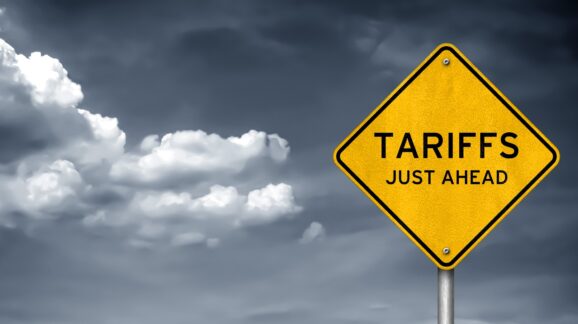Russia tariffs won’t bring peace

Photo Credit: Getty
President Trump seems to think that tariffs can accomplish almost anything. My colleague Iain Murray recently pointed out that Trump believes tariffs can raise substantial revenue, boost favored industries, and give him negotiating leverage. Trump has also admired tariffs’ powers to create jobs, rebalance imports and exports, and win the war on drugs. Apparently he also believes tariffs can end foreign wars.
President Trump on Friday announced he was considering tariffs and other measures against Russia. His goal is to encourage Russia to negotiate a peace deal with Ukraine.
The announcement was unexpected because Trump rarely criticizes Russia or Vladimir Putin and is often critical of Ukrainian president Volodymyr Zelenskyy, who unintentionally played a role in Trump’s first impeachment.
How big a deal would Trump’s proposed Russia tariffs be? Almost certainly not enough to bring Putin to the negotiating table. One reason is that Russia takes great pride in its ability to withstand and evade sanctions and other foreign economic pressure.
Instead, Russia trades with China and India, whose energy and mineral purchases help to fund Russia’s Ukraine invasion.
Most of the free world already places sanctions on Russia, and they have not discouraged Putin’s war-making. Additional American tariffs at the margin are unlikely to affect Kremlin decision-making.
One reason is that there is little Russian-US trade to tariff. Americans only import roughly $3 billion of Russian goods per year. This is less than one tenth of one percent of nearly $3.3 trillion of Americans’ total imports.
Moreover, while tariffs would likely reduce Russian imports somewhat, they wouldn’t zero them out. Russian exporters would lose less than the full $3 billion of business, further dampening an already small economic effect.
The tariffs wouldn’t be a big deal for Russia, either. Its $3 billion of exports to America are less than one percent of its $394 billion of total exports. Compare this to Russia’s $128 billion of exports to its ally China, which is more than 40 times as much. Whatever dent US tariffs could cause in Russian trade may be too small to even notice for the giant state-owned and crony-owned energy and mineral companies that do the bulk of Russian exporting. Even the noise from their variations in annual revenue is larger than that.
It is a welcome change to see Trump to stand up against Putin even a little bit. But this tariff announcement, which might not even come to pass, is at best an empty gesture. It is more likely intended to rebut criticisms that Trump is siding with Putin than it is to bring about peace.
If Russia wants peace, all it has to do is stop invading other countries. Just as tariffs are unlikely to close federal deficits or boost the economy, these proposed tariffs affecting less than one percent of Russian exports are not going to change Putin’s mind.